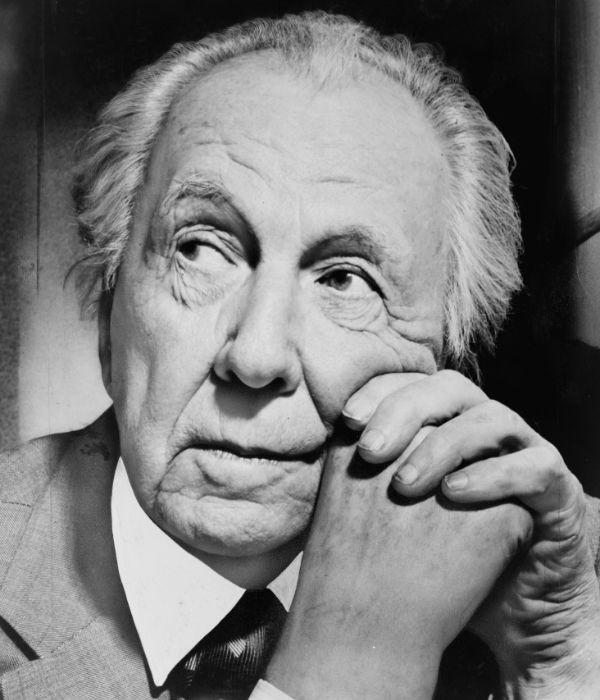Today's Birthday
Frank Lloyd Wright1867–1959, American architect, born in Richland Center, Wisconsin.
Wright is widely considered the greatest American architect. After studying civil engineering at the Univ. of Wisconsin, he worked for seven years in the office of Dankmar Adler and Louis H. Sullivan in Chicago.
The Prairie Style
Wright's first independent commission was the Winslow residence (1893). Establishing himself in Oak Park, Ill., he built a series of residences with low horizontal lines and strongly projecting eaves that echoed the rhythms of the surrounding landscape; it was termed his prairie style. The most famous examples are located in Chicago and its suburbs; they include the Willitts house (1900?–1902), Highland Park; the Coonley house (1908), Riverside; and the Robie house (1909), Chicago.
Innovative Techniques and Styles
From the beginning Wright practiced radical innovation both as to structure and aesthetics, and many of his methods have since become internationally current. At a time when poured reinforced concrete and steel cantilevers were generally confined to commercial structures, Wright did pioneer work in integrating machine methods and materials into a true architectural expression. He was the first architect in the United States to produce open planning in houses, in a break from the traditional closed volume, and to achieve a fluidity of interior space by his frequent elimination of confining walls between rooms. For the Millard house (1923) at Pasadena, Calif., he worked out a new method, known as textile-block slab construction, consisting of double walls of precast concrete blocks tied together with steel reinforcing rods set into both the vertical and the horizontal joints.
Important Works
The Larkin Office Building (1904; destroyed 1950), Buffalo, and Oak Park Unity Temple (1906), near Chicago, were early monumental works that exerted wide influence. Among other notable works are the Imperial Hotel (1916–22, destroyed 1967), Tokyo, Japan, which withstood the effects of the 1923 earthquake; the Midway Gardens (1914; destroyed 1923), Chicago; and Wright's own residence “Taliesin” (1911; twice burned and rebuilt) at Spring Green, Wis. Among his later projects were “Taliesin West” (1936–59), Scottsdale, Ariz. (which has continued since his death as a school of architecture); the Johnson administration building (1936–39; research tower, 1950), Racine Wis.; and the house for Edgar Kaufmann, “Fallingwater” (1936–37), Bear Run, Pa., which is dramatically cantilevered over a waterfall.
After World War II, Wright continued a large and ever-inventive practice until his death. He created dynamic interior spaces with spiral ramps for the V. C. Morris Gift Shop (1948–49), San Francisco, and for the Solomon R. Guggenheim Museum (1946–59), New York City. Other notable later buildings include a Unitarian church (1947), Madison, Wis.; the Price Tower (1955), Bartlesville, Okla.; and Beth Sholom Synagogue (1959), Elkins Park, Pa. He left numerous unrealized projects, including one for a mile-high skyscraper (“The Illinois”) for Chicago.
Bibliography:
Wright's architectural philosophy was expressed in his lectures and writings. Among them are On Architecture (1941); When Democracy Builds (1945); Genius and the Mobocracy (1949, enl. ed. 1971), an evaluation of his master Louis H. Sullivan; The Future of Architecture (1953); An American Architecture (1955); and A Testament (1957). His influence can be seen throughout Europe. Volumes illustrative of his works were published in France and Germany as early as 1910.
See also his autobiography (enl. ed. 1977); biographies by his daughter, Iovanna Lloyd Wright (1962), his wife, Olgivanna Lloyd Wright (rev. ed. 1970), and R. C. Twombly (1973); studies by H. R. Hitchcock (1942, repr. 1973); V. Scully (1960), P. Blake (rev. ed. 1964), H. A. Brooks (1972), Donald Leslie Johnson (1990), and Meryle Secrest (1992); catalog of his buildings by W. A. Storrer (1974, repr. 1978); bibliography by Robert L. Sweeney (1978).
Who2. Copyright © 1998-2006 by Who2?, LLC. All rights reserved.
Also Born on June 08
- Robert Schumanncomposer (1810)
- Virginia Randolpheducator (1874)
- Barbara Bushformer first lady (1925)
- Leroy Neimanpainter and printmaker (1927)
- Scott Adamscartoonist (1957)
Who Shares Your Birthday?
The Day You Were Born
The Year You Were Born











